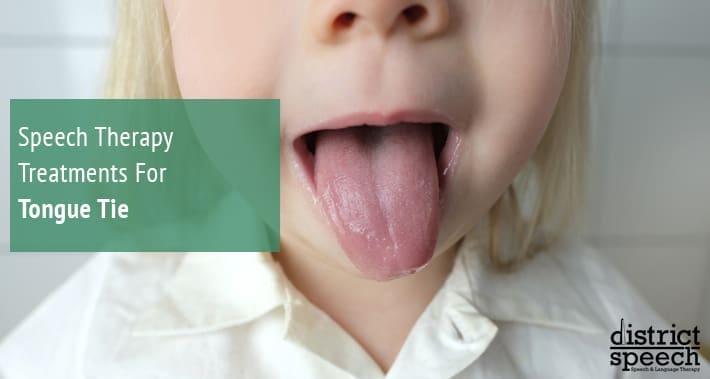
Whether you’re a new parent or have been parenting for years, learning your child has tongue tie can be a worrisome experience.
The good news is you’re not alone.
There has been a lot of research on tongue tie in recent years and treatments like Washington DC speech therapy for kids can be a big help.
Not sure if speech therapy is right for your child?
In this article we’ll take a deeper look at tongue tie to help you make the best decisions moving forward for your family.
First, we need to get a better understanding of what a tongue tie is.
What Is A Tongue Tie?
If you lift your tongue, and look in the mirror, you’ll see a string of tissue that runs underneath your tongue.
This piece of tissue is called the lingual frenulum, and it’s perfectly natural for it to be there.
Tongue tie occurs when this piece of tissue is either too short or too thick and is tethered to the bottom of the mouth at birth.
In some cases, it might not be very noticeable, but ultimately, tongue tie restricts the tongue’s ability to move around.
Sometimes, tongue tie doesn’t cause much of an issue, but in other cases it can lead to problems with eating, speaking, and swallowing.
What causes tongue tie? Keep reading to find out.
What Causes Tongue Tie
For most people, the lingual frenulum separates from the bottom of the tongue before birth.
Tongue tie is caused when this string of tissue does not separate.
You may be wondering if it’s possible to know if your baby will develop tongue tie?
Unfortunately, the causes of tongue tie are still a bit of a mystery.
Here’s what we do know
- Tongue tie is more common in males than females
- Sometimes tongue tie runs in families
- Some cases of tongue tie have been connected to genetic factors
Although there isn’t a lot of info about the causes of tongue tie, what’s more important is being able to identify the symptoms.
In this next section we’ll look at the signs to look out for if you suspect your child is experiencing tongue tie.
Symptoms of Tongue Tie
It’s important to be aware of the symptoms of tongue tie, particularly in babies, because tongue tie can impact oral development.
What symptoms should you look out for in your child?
- If the child is a baby, they may have problems latching or be fussy when breastfeeding
- Babies may also be underweight due to difficulty feeding
- When the child sticks out their tongue, it might appear heart shaped
- Some children may have difficulty sticking their tongue out beyond their bottom front teeth
- If the child is older, they might demonstrate challenges speaking or eating
- They might have trouble moving their tongue from side to side
Are simple tasks that require the tongue to move freely difficult for your child?
It may sound like a silly question, but if you notice something as simple as licking ice cream or a lollipop can be a struggle for your child, it could be a sign of tongue tie.
If your worried your child may be having problems caused by tongue tie, it’s a good idea to consult a speech therapist.
Maybe you already know your child has a tongue tie.
Did you know speech therapy can help?
Keep reading to learn more.

How Can Speech Therapy for Tongue Tie Help?
Have you noticed that your child is having a hard time making sounds that other children their age can make without issue?
If they have a tongue tie, that could be causing their difficulties.
Because tongue tie impacts their tongue’s range of motion it can lead to challenges and bad habits with their speech.
This is where a speech therapist comes into the picture.
Not all children with tongue tie have problems with speech, but for those who do, a speech therapist can help them explore what sounds are difficult to make and address the problem from a professional perspective.
Do you think your child could benefit from speech therapy?
If so, don’t hesitate to…
Book Your Appointment With District Speech Today
If you’re concerned that your child’s development is being negatively impacted by a tongue tie, consulting a speech therapist could be an excellent step forward.
Here at District Speech, we can offer speech therapy evaluations to help understand whether it’s tongue tie or another related condition that’s causing your child’s speech and language concerns.
From there, your pediatric speech therapist will put together a treatment plan designed to address these issues, with the goal of helping your child to communicate openly and clearly.
Book your appointment With District Speech today.
1300 I St NW, Suite 400 E,
Washington, DC 20005
- https://g.page/districtspeech
District Speech and Language Therapy specializes in speech therapy, physical therapy, and occupational therapy solutions, for both children and adults, in the Washington D.C and the Arlington Virginia areas.